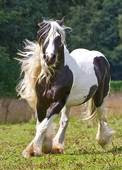 By Lisa Marie Wilkinson
By Lisa Marie WilkinsonMy mother tells a tale from her own childhood in rural Ohio about the day the Gypsies came to town. Fascinated by these engaging, colorfully dressed people, my mother (who was age seven at the time) ran into the street in order to observe them at closer proximity. Horrified, my grandmother collected her only daughter with great haste and dragged her back into the safety of their house, admonishing her not to leave home until the Gypsies had gone. When asked why, my grandmother told my mother with absolute conviction, "Because Gypsies steal children!"
 There was no evidence to prove any merit to my grandmother's fear, but this childhood anecdote serves as a telling illustration of a race of mysterious people plagued by centuries of bias and misrepresentation.
There was no evidence to prove any merit to my grandmother's fear, but this childhood anecdote serves as a telling illustration of a race of mysterious people plagued by centuries of bias and misrepresentation.Let's pretend we're members of a Gypsy (or "Traveller") family and explore what life as a Gypsy might be like.
 It is likely that you live on the road, although some Travellers have adopted permanent housing. Even in the age of technology, you might still live and travel in a horse-drawn wagon. Although you've reached adulthood, you have never stepped foot inside a classroom because education is not a priority in your culture. Although you may lack formal education, you excel at survival skills. You can milk a goat, and can gather enough wild foodstuffs to feed your large family, which includes ten children. You can differentiate the poisonous mushrooms from the ones that make a satisfying stew.
It is likely that you live on the road, although some Travellers have adopted permanent housing. Even in the age of technology, you might still live and travel in a horse-drawn wagon. Although you've reached adulthood, you have never stepped foot inside a classroom because education is not a priority in your culture. Although you may lack formal education, you excel at survival skills. You can milk a goat, and can gather enough wild foodstuffs to feed your large family, which includes ten children. You can differentiate the poisonous mushrooms from the ones that make a satisfying stew.You work hard, caring for the younger children in the family and helping your father with the care of the Gypsy ponies he's raising to sell in order to provide for his family. If you live outdoors rather than in permanent housing, you dread the cold winters huddled around a wood burner in the forest.
 Outsiders you meet assume your habits are unhygienic and may also conclude that you are a thief, even though your culture has strict customs regarding cleanliness and you've never stolen so much as a penny candy from the local grocery because there are so many children in the family that the children are not included in shopping forays into town. Others in camp might indulge in petty thievery, but no more so than the non-Gypsy population in the area.
Outsiders you meet assume your habits are unhygienic and may also conclude that you are a thief, even though your culture has strict customs regarding cleanliness and you've never stolen so much as a penny candy from the local grocery because there are so many children in the family that the children are not included in shopping forays into town. Others in camp might indulge in petty thievery, but no more so than the non-Gypsy population in the area. You have an ingrained respect for your elders, always addressing older males as "uncle," and older females as "aunt," but never by their first name, because the familiarity implies a lack of respect. If you are a married female, you've left your own family to join that of your husband when you married, and you will continue to gain respect within the family as you age and bear and raise children.
With origins that can be traced back to medieval India, your nature urges you to roam, and you look forward to movement and new scenery, but as you settle down in front of the campfire to rest for the evening, or inside a permanent structure if you've become a house dweller, it is likely you will turn to music as a source of entertainment. Romany (Gypsy) music has influenced other musical cultures throughout the world.
 Lisa Marie Wilkinson is an IPPY Gold Medal winning author of historical adventure-romance. Her latest novel, STOLEN PROMISE, featuring vibrant Gypsy characters and breath-taking romance, is available now.
Lisa Marie Wilkinson is an IPPY Gold Medal winning author of historical adventure-romance. Her latest novel, STOLEN PROMISE, featuring vibrant Gypsy characters and breath-taking romance, is available now.